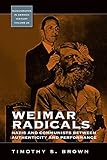Weimar Radicals : Nazis and Communists between Authenticity and Performance / Timothy Scott Brown.
Material type: TextSeries: Monographs in German History ; 28Publisher: New York ; Oxford : Berghahn Books, [2009]Copyright date: ©2009Description: 1 online resource (225 p.)Content type:
TextSeries: Monographs in German History ; 28Publisher: New York ; Oxford : Berghahn Books, [2009]Copyright date: ©2009Description: 1 online resource (225 p.)Content type: - 9781845455644
- 9781845459086
- Authenticity (Philosophy) -- Case studies
- Communism -- Germany -- History -- 20th century
- Group identity -- Case studies
- Masculinity -- Political aspects -- Germany -- History -- 20th century
- Militarism -- Germany -- History -- 20th century
- National socialism -- Germany -- History -- 20th century
- Radicalism -- Germany -- History -- 20th century
- Working class -- Germany -- Political activity -- History -- 20th century
- Youth movements -- Germany -- History -- 20th century
- HISTORY / Europe / Germany
- History: 20th Century to Present
- 324.243023 23
- online - DeGruyter
| Item type | Current library | Call number | URL | Status | Notes | Barcode | |
|---|---|---|---|---|---|---|---|
 eBook
eBook
|
Biblioteca "Angelicum" Pont. Univ. S.Tommaso d'Aquino Nuvola online | online - DeGruyter (Browse shelf(Opens below)) | Online access | Not for loan (Accesso limitato) | Accesso per gli utenti autorizzati / Access for authorized users | (dgr)9781845459086 |
Frontmatter -- CONTENTS -- List of Figures -- Acknowledgements -- Abbreviations -- 1 The Revolt of the Masses: Populist Radicalism and the Discontents of Modernity -- 2 Faces of Social Militarism in the Weimar Republic -- 3 National Socialism and Its Discontents -- 4 German Communism and the Fascist Challenge -- 5 Between Gleichschaltung and Revolution -- Conclusion -- Notes -- Bibliography -- Index
restricted access online access with authorization star
http://purl.org/coar/access_right/c_16ec
Exploring the gray zone of infiltration and subversion in which the Nazi and Communist parties sought to influence and undermine each other, this book offers a fresh perspective on the relationship between two defining ideologies of the twentieth century. The struggle between Fascism and Communism is situated within a broader conversation among right- and left-wing publicists, across the Youth Movement and in the “National Bolshevik” scene, thus revealing the existence of a discourse on revolutionary legitimacy fought according to a set of common assumptions about the qualities of the ideal revolutionary. Highlighting the importance of a masculine-militarist politics of youth revolt operative in both Marxist and anti-Marxist guises, Weimar Radicals forces us to re-think the fateful relationship between the two great ideological competitors of the Weimar Republic, while offering a challenging new interpretation of the distinctive radicalism of the interwar era.
Mode of access: Internet via World Wide Web.
In English.
Description based on online resource; title from PDF title page (publisher's Web site, viewed 25. Jun 2024)


